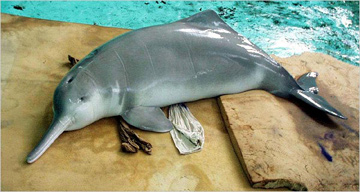Rare Chinese river dolphin sighting in question
mongabay.com
September 1, 2007
|
|
A prominent researcher is skeptical of last week’s reported sighting of the baiji, the Chinese river dolphin declared extinct earlier this year, according to the New York Times. The sighting near Tongling city in Anhui Province — widely reported in Chinese and Western media — was captured on video.
Dr. Robert L. Pitman of the National Oceanic and Atmospheric Administration’s Fisheries Ecosystem Studies Program told science writer Andrew Revkin of the New York Times that “Chinese scientists who have reviewed the supposed videotape are far from certain that it shows a baiji at all,” writes Patrick Lyons in the blog, . Pitman took part in a 6-week search for the species earlier this year.
According to baiji,org, a group that seeks to protect the dolphin, leading baiji researcher Wang Ding from the Institute of Hydrobiology, Wuhan, said “he could not give a 100 percent confirmation since the video was of poor quality and taken from a distance of about 1000 metres away.”
Nevertheless, the discovery of a surviving baiji would not be unexpected. Experts have declared the species “functionally extinct” — meaning that the baiji is likely doomed to extinction even if some stragglers continue to survive in the muddy waters of the Yangtze.
 One of the last known baiji, photographed in captivity before its death in 2002. Institute of Hydrobiology, Wuhan, China |
“Any surviving baiji are unlikely to be able to find each other for breeding in the huge river and are threatened by ship traffic, overfishing and the increasing degradation of their habitat,” explained a statement from baiji.org.
“We may have missed one or two baiji during our survey,” Pitman is quoted by New York Times as saying, “but the prognosis remains the same.”
“We have to accept the fact, that the Baiji is functionally extinct. It is a tragedy, a loss not only for China, but for the entire world,” said August Pfluger, a noted Baiji expert and head of baiji.org.
Pfluger and colleagues say they plan “a small survey in the area the film was shot within the next few weeks to conduct further investigations.” If they manage to find any dolphins the team will attempt to coordinate a rescue to transfer baiji to the dolphinarium of the Institute of Hydrobiology in Wuhan. Should captive breeding efforts fail, some speculate that Chinese researchers may try to clone to species to bring it back to life.
 The Baiji or Yangtze River Dolphin. Photo by Wang Ding and courtesy of the Institute of Hydrobiology, Chinese Academy of Sciences. |
Still Dr. Pitman says there may be other motives behind the enthusiasm for the questionable baiji sighting.
“Not to be too cynical here, but those same people have gotten a lot of their institutional funding for nominally protecting baiji over the last couple of decades — no baiji, no funding,” he told the New York Times
Michael F. Richlen, a biologist at the University of Hawaii who was part of the 2007 baiji expedition and co-authored a Biology Letters paper on the species’ disappearance, agrees.
“I can understand how this possible sighting may increase research funds to various conservation organizations,” Richlen told mongabay.com. “I have seen portions of the video as well as screenshots and am in agreement with Wang Ding and other researchers from IHB that the evidence is not conclusive for a positive species identification. This sighting warrants further investigation, and it is very likely that a few individuals may still be alive in the Yangtze river system but as Bob Pitman said, ‘the prognosis remains the same’, the baiji are functionally extinct.”
While it may be too late for the baiji, Chinese rivers still support a population of freshwater cetacean: the endemic Yangtze Finless Porpoise. Baiji.org has now made their conservation a priority.
“Their numbers are declining at an alarming rate. If we do not act soon they will become a second Baiji”, said Wang Ding, deputy director of the Institute of Hydrobiology of the Chinese Academy of Science in Wuhan.